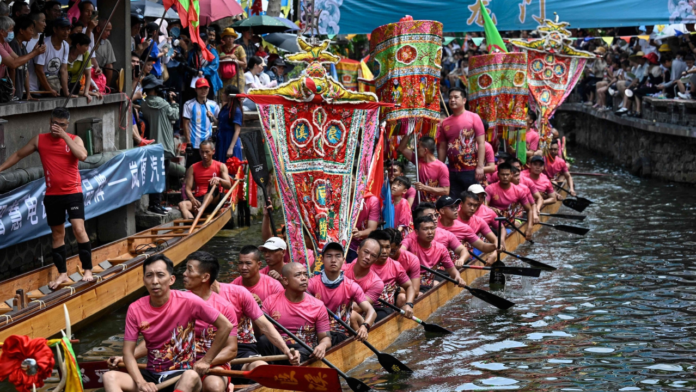The Dragon Boat Festival, or Duanwu Jie (端午节), is one of the most beloved traditional holidays in China. Customarily occurring on the fifth day of the fifth lunar month (which is in late May or early June), this holiday is a colorful blend of sport, food, culture and ancient traditions. It is best known for thrilling dragon boat races, delicious zongzi (sticky rice dumplings), and the commemoration of Qu Yuan, a legendary poet and statesman.
Major Traditions and Celebrations
- Dragon Boat Races (赛龙舟)
The dragon boat races are the most recognisable part of the festival. Teams paddle ornately decorated boats that take the shape of dragons as they race, spurred into action by the rhythmic beat of drum sounds.
It is said to be based on the villagers trying to rescue Qu Yuan or retrieve his body from the river. Today, dragon boat racing is an internationally recognized sport with competitions held in China and around the world.
2. Eating Zongzi (粽子)
Zongzi, a traditional delicacy usually made of glutinous rice wrapped in bamboo or reed leaves, is an inseparable part of every Dragon Boat Festival. These sticky rice dumplings are flavored regionally:
- Sweet zongzi — those stuffed with red bean paste, dates, or sweetened lotus seed paste (common in north China)
- Savory zongzi — filled with pork, salted egg yolk, mushrooms or beans (common in southern China)
Zongzi making is a family affair, often involving several generations wrapping and steaming the goodies together.
3. Commemorating Qu Yuan
Frantically splashing vegetables and spices, the man uses a lot of posts to add up to both national and cultural justice to everyone who eats Zhongzi. This festival is closely related to the vocational and professional poet Qu Yuan (屈原) of that day.
A wise and loyal adviser, Qu Yuan attempted to fight corruption, but the corrupt advisers to the king silenced him and his state fell. He leaped into the Miluo River and drowned himself. Local villagers, who revered him, rushed in their boats to search for him and tossed rice into the river so fish would not eat his body. This myth is the origin of the dragon boat races and zongzi traditions.
4. Warding Off Evil Spirits
The fifth lunar month is unlucky at the best of times: in ancient times, it was associated with disease and misfortune. People created all kinds of rituals to protect themselves:
- Mitigating evil spirits by hanging calamus and mugwort leaves on doors and windows
- Realgar wine, which was believed to have protective and medicinal properties
- [ Wearing scented sachets (香囊) filled with small packages of aromatic herbs to ward off bad luck. ]
- Family Gatherings and Folk Entertainment
Dragon Boat Festival is also a reunion time for family. Families come together to create and savor zongzi, join local celebrations and watch traditional folk performances like:
- Along with Chinese opera and storytelling
- Unicorn and lion dances
- Folk and poetry recitals
Historical Background
- Origins of the Festival
Although Qu Yuan’s story is the most widely known, some historians think the festival predates him. It is believed to date back to ancient rituals for fertility and prayers for a good rice harvest, which eventually merged with the story of Qu Yuan to create the modern-day celebrations.
- Qu Yuan’s Legacy
Qu Yuan is regarded as one of the greatest poets in Chinese literature, and his works, including “The Lament (离骚),” remain studied, celebrated and inspiring to this day. His commitment to his country has left him a symbol of patriotism and an influence for centuries.
- UNESCO Recognition
Th dragon boat festival was included in the Representative List of the Intangible Cultural Heritage of Humanity by UNESCO in 2009.
- National Holiday Status
The Dragon Boat Festival has been widely celebrated for centuries, but in 2008, it became an official public holiday in China. This enables individuals nationwide to participate in the celebrations, family gatherings, and cultural traditions without the obligations of work or school.
While Dragon Boat Day may seem like just a thrilling boat race, the truth is the festival is steeped in history, culture, and traditions that have run deep through generations.
Festival, whether by the excitement of the competition or the consumption of zongzi or by carrying on the spirit of Qu Yuan, is still one of the festivals that families get together the most. As the dragon boats race through the water, the essence of tradition, togetherness and resilience continues to be celebrated on this national holiday.

